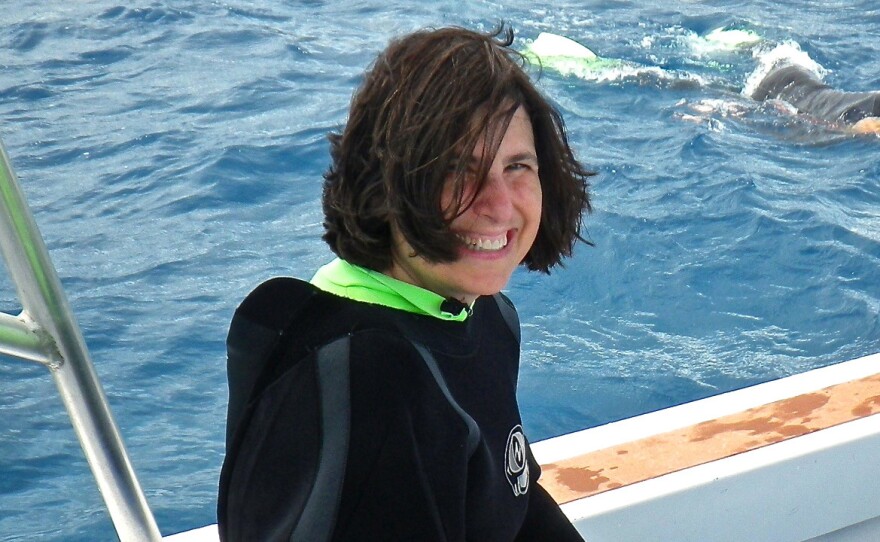Our friend and colleague Peggy Girshman, a longtime NPR editor and co-founder of Kaiser Health News, died in March. But her passion for health journalism survives her. She made sure of that.
Beyond the many journalists whose careers she launched and nurtured, Girshman wrote her own eulogy, complete with some hard-earned advice on matters of personal health and how to cover health and medicine.
NPR correspondent Rob Stein read it Saturday at a memorial service attended by more than 150 people, including a who's who of health and science journalists, at Brookside Gardens in Silver Spring, Md.
Before and after the speeches, there were cookies — lots of cookies — baked by fellow members of her Christmas cookie club.
Mitch Berger, Girshman's husband, gave us permission to publish her "auto-eulogy," as she called it, which has been edited lightly for clarity and length.
There's a common saying that, on their deathbed, no one says, "I wish I had spent more time at work." I'm an exception to that. A central tragedy in my life is that I couldn't work longer, if only to convince someone I was right about something.
I also wish I had divided my life to spend more time with my family, especially Beth, Helen, Irv, Natalie, Lianna and Annie, whom I order around and love like a niece. Well, maybe not much more time with my parents. And my friends, including the myriad of best friends, you all know who you are. And you've all been the best of friends to me, especially in the last few years.
OK, now that that's over with, I'm taking a few minutes when you have to listen to me. I'm only sorry I couldn't be there for your rapt attention and adherence to my advice. Here we go.
For folks with Stage 0 or less cancers, especially DCIS [ductal carcinoma in situ], or prostate, watch and wait. I understand. I was one of those people who say, "Get it out of me." Please resist that temptation.
At least half of these don't go on to become invasive cancers. Why should you do all kinds of bad things to your body unnecessarily? And, by the way, it costs waaaay too much.
If you are one of those people who can't resist the call of the surgeon, do not get a lumpectomy, aka "breast conserving" surgery. I can tell you that from personal and observational experience, it doesn't conserve the breast.
After the surgery, which often has to be done twice to get clean margins, there is the whole nightmare of radiation, which shrinks tissue and makes for painful inner scarring. Biggest mistake of my life was to do that. And there are a lot of mistakes to choose from.
If I only convince one of you to at least convince one other person, I've accomplished something. I know, I've done so much good work blah blah blah. But even one person not having surgery would be the crowning achievement of my life. I am not kidding.
Setting aside my own body (oh yeah, it really is set aside now), let's talk a little about evidence.
If you get nothing else from this memorial service, please think about evidence, truth as best it can be determined. Anecdotal evidence is only meaningful if it involves me, Peggy Girshman. Otherwise, trust the scientific method, where similar groups are compared and with large sample sizes, if possible. Especially when it comes to what you put in your body for medicinal reasons.
OK, I know there's a lot of eye-rolling out there right now. But why would you take anything that hasn't been proved to work? Belief is powerful. The placebo effect exists.
While we're at it, please stop with the lifestyle advice.
Don't knock people about what they're eating, how much or when. Yes, if you eat a lot of fresh fruits and vegetables and cut down on fat, you have lowered the chances you'll get cancer or heart disease.
But that is just one of so many factors, that to judge people about their quantity of fruits and vegetables is simply unfair.
Don't ask, if someone has lung cancer, if they smoked. Try really, really hard not to even think it in your head. It shows, believe me. It adds pain to an already painful, scary time.
Try to convince yourself that people get sick for so many reasons that we don't know about. One little mutation in one little cell.
Two people eating the same amount of sugar or carbs every day for years: One might develop diabetes and the other doesn't. Please don't examine what one person is eating to cast disapproval in your head while the other one gets a pass.
When 10 studies can't find any connection between X and Y, please believe it. Don't think about your friend or even yourself where it seemed to go the other way. Of course it sometimes goes the other way, but why would you want to live your life based on your friend, who is lovely but might have another claim next week.
Don't say, "I don't know how you can find anything in your office/house/car." In other words, wow, you're a slob. Yes, I'm messy, what do you care? Neat, vegetable-eating people are not morally superior to anyone else.
Be nice to people. Sounds really corny and pedestrian, but it's how I managed to succeed at work, no s***.
Always make sure there are cookies or something tasty to eat at any in-person meeting. As there should be, right now, in the back. You'll get to them very soon, I promise.
Copyright 2016 NPR. To see more, visit http://www.npr.org/.






